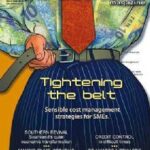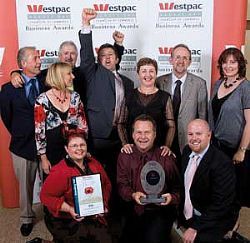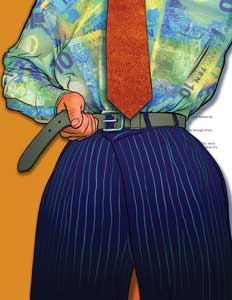MEMO FROM THE TRENCHES
It may be a battlefield out there – but one manufacturer, under fire from cheap imports, has survived through smart management and fast market response. But that’s not to say that a little legislative support still wouldn’t go amiss. By Glenn Baker.
To say that times are tough for New Zealand’s manufacturers right now is an understatement to say the least. The challenges are many – rising overheads and raw commodity prices, reduced product demand, the never-ending tide of cheap imports – the list goes on. For East Tamaki furniture manufacturer Interior Resources Limited (IRL) the current economic recession represents the latest in a long line of tough trading cycles it has had to endure over the years. But three decades of savvy management has given this family owned and operated company a resilience and flexibility that should help them to weather this unprecedented global downturn as well. Brian Shaw founded the original family furniture manufacturing business in 1978 in a small 2500 square foot factory, with son Peter, whose job description included chief welder, upholsterer, assembler and dispatcher. Brian ran sales and administration and had previously held management positions with such iconic furniture companies as L.J. Fisher and Namco – which, even by today’s standards were large manufacturing operations. IRL manufactures steel-tube based seating products, plus tables, desks and storage furniture for the education, health, hospitality and commercial retail markets. Launched in 1990, its SitRite brand of school furniture introduced a range of design and colour options and this furniture has become a familiar sight inside the country’s schools. Without doubt, one of the greatest challenges for IRL in recent times, and indeed the whole local furniture industry, has been the tide of, what Peter describes as “inferior quality products crossing our borders with little or no controls”. The company has not given up without a fight over this issue. “Three years ago we invited the government to visit our facility because we were already concerned about the impact of imports on our business. “Our catch phrase was ‘Fair Trade’, rather than ‘Free Trade’, but the government seemed hell bent on signing the FTA with little regard for our industry,” he says. “Ever increasing compliance and raw material costs and pressure to embrace ‘environmentally-friendly’ raw materials in our designs and processes had us on the back-foot. Our concern was that imports weren’t subject to the same controls. “We lobbied for border controls on the quality and compliance of imported products, to maybe set minimum standards. We wanted to raise awareness of how much of this imported product quickly ends up in our landfills, and how materials such as high-formaldehyde-emission board, resins and other non-recyclable materials feature in these low quality furniture items. This, in turn, can create health and safety issues.” Shaw says their arguments largely fell on deaf ears, and the advice was to seek niche markets and smaller runs – which the company was already in the throes of doing. Survival tactics So, while other long established furniture manufacturers have fallen by the wayside, how has IRL managed to survive in recent times? “We’ve adapted to the changes in the marketplace and strengthened our position by offering more choice in design and colour – and a warranty we stand by,” says Shaw. “By reducing our lead times we can compete better with imported product, and now that the dollar has dropped, locally-produce product has suddenly become more price competitive against imports.” In the current economic situation importers are now looking at local suppliers to purchase product to cover individual orders as opposed to paying upfront for containers of stock, says Shaw. “But whilst it could be an advantage to us right now, it will only be a temporary fix.” For a more permanent solution, Shaw would like to see the government throw more weight behind the ‘Buy NZ Made’ campaign – to push the message about keeping Kiwis in jobs and encourage shoppers to question where products are from and what warranty they come with. Constraints on inferior quality furniture entering the company would also be welcomed, and minimum standards imposed that will level the playing field with locally made product. Shaw points out that other governments are currently subsidising their manufacturers to offset the fall in the US dollar, to keep exporters competitive and people in jobs. “Our government needs to do something as well to protect and preserve our manufacturers, its people and their skills. It’s hard enough competing against the sheer size of overseas companies let alone deal with subsidised products and pricing as well,” he says. Battle strategy While Shaw is concerned over the prospect of a decline in business across all sectors they sell into, the company’s outlook remains positive. “We’re looking for opportunities; we’re working with our suppliers to help with competitive raw material costs and reduced lead times. Plus we’re working closer than ever with our customers – if we help them more, it’ll help us more in the long run.” The current economic climate does have its positives, says Shaw, in that it forces companies to look at their overhead costs more closely and run their operations more efficiently. And there’s a greater incentive to find new markets and opportunities. Shaw is determined to maintain company profits and deliver continued security to IRL’s 30 employees and to its shareholders. His 2009 business goals include lifting productivity and increasing staff skill sets so the company has the ability to compete in any competitive environment. With the right support and focus, all of the above is definitely achievable, he believes. It’s what gets him out of bed to fight each day. “Aside from the considerable investment we’ve made in the company and all the blood, sweat and tears over the years, above all we believe we have a moral obligation to our staff, particularly our long-serving employees, to maintain and uphold their employment security. “After all, they helped grow and make the business what it is today.” And that’s clearly a fighter – not a quitter. Glenn Baker is editor of NZBusiness.




